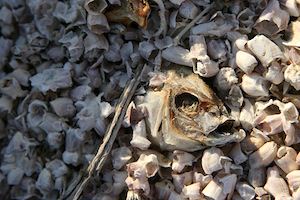SoCal Fish Populations Dropped 78 Percent Over Last 40 Years
Scientists sifting through records of fish caught in the cooling systems of five coastal power plants confirmed "there has been a steep, ongoing drop in a wide variety of fish in the region over several decades," the Los Angeles Times reported Wednesday.
Scientists sifting through records of fish caught in the cooling systems of five coastal power plants confirmed “there has been a steep, ongoing drop in a wide variety of fish in the region over several decades,” the Los Angeles Times reported Wednesday.
Eric Miller, a senior scientist at MBC Applied Environmental Sciences, the consulting firm that conducted the research along with UC San Diego, told the Times: “The coastal fish community that we have here in Southern California has changed dramatically and we can’t relate it to anything other than a regional oceanographic climate effect. I knew that there was a decline, but coming so close to 80% was startling to me.”
The researchers don’t fully understand what is behind the destruction of fish populations, but they said it could be related to changing seawater density and rising ocean temperatures from global warming.
— Posted by Alexander Reed Kelly.
Your support matters…Los Angeles Times:
The study ruled out overfishing as the main driver of the decline. That’s because the power plant records showed that fish such as salema, which are not harvested by commercial or recreational fishermen, have been declining at about the same rate as commonly fished species such as sardines.
Many of the fish in decline are small, schooling fish such as sardines and anchovies, known as “forage fish” because they feed larger sport fish, seabirds and marine mammals. A downturn in their numbers could be altering the structure of the marine food web and be playing a role in the malnutrition and deaths in predators like California sea lions, the researchers said.
A 2011 study by researchers at the Scripps Institution of Oceanography found that kelp bass and barred sand bass, two of the most-caught saltwater fishes in Southern California, have plummeted 90% since 1980.
Independent journalism is under threat and overshadowed by heavily funded mainstream media.
You can help level the playing field. Become a member.
Your tax-deductible contribution keeps us digging beneath the headlines to give you thought-provoking, investigative reporting and analysis that unearths what's really happening- without compromise.
Give today to support our courageous, independent journalists.






You need to be a supporter to comment.
There are currently no responses to this article.
Be the first to respond.